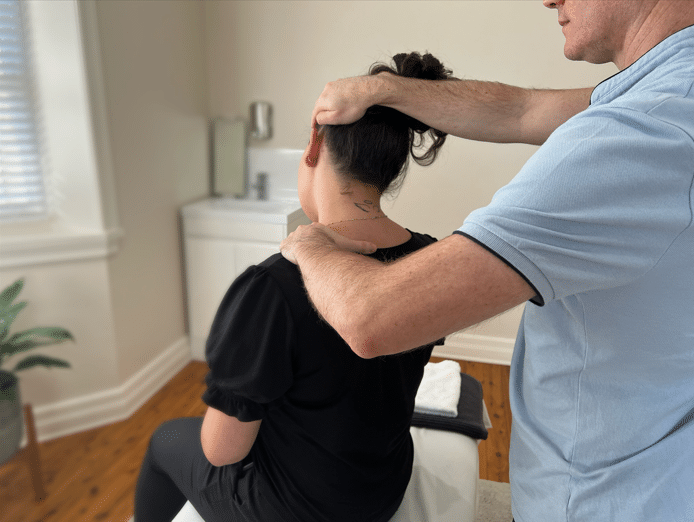- 02 9712 1736
- [email protected]
- 212 Great North Road, Five Dock, NSW 2046
- Open 7 days a week
You wake up one morning, and something feels terribly wrong. As you try to turn your head, a sharp, intense pain stops you mid-movement. Your neck is locked in an uncomfortable position, tilted slightly to one side, making even the simplest actions like checking your blind spot while driving seem impossible. This is the typical experience for many who have suffered from torticollis, a condition that can transform an ordinary day into a struggle with persistent discomfort.


Contrary to popular belief, torticollis isn’t confined to a single demographic. It can affect anyone from newborn infants to elderly individuals, creating a unique challenge for healthcare professionals. In infants, the condition might be noticed shortly after birth, often resulting from positioning in the womb or during delivery. Adults can develop torticollis due to a variety of reasons, from sudden movements to underlying health conditions.
Middle-aged adults frequently encounter this condition, particularly those with sedentary jobs or those experiencing significant stress. Professionals who spend long hours at desks, drivers who maintain fixed positions for extended periods, and individuals with high-stress occupations are particularly susceptible. The condition doesn’t discriminate – it can strike anyone, regardless of age, gender, or fitness level.
Torticollis doesn’t emerge from a single source but rather from a complex interplay of factors. Some individuals develop the condition congenitally, meaning they’re born with a predisposition. Others acquire it through various environmental and lifestyle triggers. Medical conditions like respiratory infections, neurological disorders, or even medication side effects can contribute to its development.
Imagine your neck muscles as a finely tuned instrument. Just as a musical string can become tense and misaligned, so too can your neck muscles. Sleeping in an awkward position, sudden temperature changes, or even emotional stress can trigger the initial muscle tension. A minor movement – turning to look at something quickly – can then push these already-tense muscles into a full spasm.
At the heart of torticollis lies a fascinating interplay of nervous system activity. Think of your nervous system as an intricate communication network. When something disrupts this network, it can send muscles into an overprotective mode. Increased nervous system activity creates a cascade of responses that result in muscle spasms, causing the characteristic twisted neck position.
This isn’t simply a matter of muscle tightness. It’s a complex neurological response where the nervous system essentially “locks” muscles in a protective stance. Imagine your body’s internal alarm system going into overdrive, causing muscles to contract and resist movement as a defensive mechanism. This protective response, while well-intentioned, can create significant discomfort and limitation.

Chiropractic care approaches torticollis as more than just a physical ailment. Practitioners view it as a comprehensive musculoskeletal challenge that requires a nuanced, patient-centered approach. The goal isn’t merely to reduce pain but to understand and address the underlying factors contributing to the condition.
Through careful assessment, chiropractors identify specific musculoskeletal deficits. Manual therapy techniques are employed to gently release muscle tension, improve blood circulation, and restore natural movement patterns. This isn’t about forcing the neck into submission but rather coaxing it back to proper function through precise, gentle interventions.
The approach extends beyond immediate treatment. Chiropractors provide guidance on posture, ergonomics, and specific exercises that can help prevent future occurrences. It’s a collaborative process that empowers patients to understand their body’s signals and take proactive steps in their recovery.
Torticollis might seem like an intimidating condition, but it doesn’t have to define your life. Understanding its mechanisms, recognizing early signs, and seeking professional guidance can make a significant difference. Each individual’s experience with torticollis is unique, requiring a personalized approach to management and recovery.
If you’re experiencing persistent neck discomfort, don’t hesitate. Consult with a healthcare professional who can provide a comprehensive assessment and guide you towards healing. Your neck is more than just a connection between your head and body – it’s a complex system deserving careful, thoughtful care.
Forest Lodge, Annandale, Glebe, Leichhardt, Balmain, Haberfield, Canada Bay, Rozelle, Rodd Point, Wareemba, Stanmore, Petersham, Lilyfield, Hunters Hill, Enfield, Cabarita, Mortlake, Rhodes, Burwood Heights, Birchgrove, Gladesville, Huntleys Point, Abbotsford, Ashfield, Croydon Park, Croydon, Chiswick, Russell Lea, Burwood, Strathfield, Concord, Drummoyne, North Strathfield, Liberty Grove, Dulwich Hill, Lewisham, Camperdown, Ashbury, Homebush, Homebush West, Woolwich, Henley, Summer Hill, Sydney Olympic Park


About
Five Dock Osteopathic & Chiropractic is located in Canada Bay, in Sydney’s Inner West. Servicing suburbs including Burwood, Croydon, Drummoyne, Five Dock, Haberfield, Concord, Abbotsford, Chiswick, Leichhardt, Wareemba, Russell Lea, Summer Hill, Strathfield.
Clinic hours
Monday, Tuesday, Thursday 7AM – 7PM
Wednesday, Friday 7AM – 6PM
Saturday 7AM – 2PM
Sunday 8AM – 2PM
Contact details